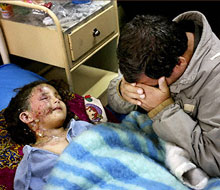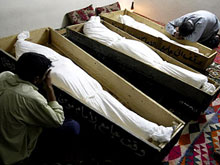Support Our Troops, Bring Them
Home
The last feeble excuse for the presence of U.S. troops in Iraq has been demolished by a comprehensive study of
who the terrorists are and what motivates them. Conclusion: the U.S. presence only makes things worse. If your
mind has been poisoned against the voices of the anti-war movement, then consider this exerpt from the American Conservative, July 18, 2005 — an interview with Associate Professor Robert Pape, author of Dying to Win:
The Logic of Suicide Terrorism: It's the Occupation,
Not the Fundamentalism
RP: The central fact is that overwhelmingly suicide-terrorist attacks are not driven by religion
as much as they are by a clear strategic objective: to compel modern democracies to withdraw military forces from
the territory that the terrorists view as their homeland. From Lebanon to Sri Lanka to Chechnya to Kashmir to the
West Bank, every major suicide-terrorist campaign-over 95 percent of all the incidents-has had as its central objective
to compel a democratic state to withdraw.
TAC: That would seem to run contrary to a view that one heard during the American election
campaign, put forth by people who favor Bush's policy. That is, we need to fight the terrorists over there, so
we don't have to fight them here.
RP: Since suicide terrorism is mainly a response to foreign occupation and not Islamic fundamentalism,
the use of heavy military force to transform Muslim societies over there, if you would, is only likely to increase
the number of suicide terrorists coming at us.
Since 1990, the United States has stationed tens of thousands of ground troops on the Arabian Peninsula, and
that is the main mobilization appeal of Osama bin Laden and al-Qaeda. People who make the argument that it is a
good thing to have them attacking us over there are missing that suicide terrorism is not a supply-limited phenomenon
where there are just a few hundred around the world willing to do it because they are religious fanatics. It is
a demand-driven phenomenon. That is, it is driven by the presence of foreign forces on the territory that the terrorists
view as their homeland. The operation in Iraq has stimulated suicide terrorism and has given suicide terrorism
a new lease on life.
Who would Jesus bomb?
  
|

American G.I.s are discovering
that their payoff is also part of the collateral damage.
While U.S troops were busy defending big business, the House of Representatives
voted to cut benefits to veterans by nearly $25 billion dollars. This included an immediate cut of $844 million
from veterans’ health care, with a total of $9.7 billion in cuts over the next ten years.
In the words of Win Without
War national director, Tom Andrews: "At a time when U.S. troops are fighting in the Gulf, it is political
hypocrisy for the House to slash benefits for veterans." We believe that Members of Congress who voted to
cut veterans’ benefits should be held accountable. To call Members of Congress who voted to cut veterans benefits
and express your opposition, click on the Hall
of Shame .
Get mad, America; and then do something constructive with your anger...
Impeach
Bush Now
An online impeachment petition sponsored by Veterans for Peace:
Veterans Working Together for Peace & Justice Through Non-violence. Wage Peace!
Who would Jesus bomb?
The
Christian Paradox: How a faithful nation gets Jesus wrong
Bill McKibben / Harper's Magazine / August 2005
Depending on which poll you look at and how the question is
asked, somewhere around 85 percent of us call ourselves Christian. America is simultaneously the most professedly
Christian of the developed nations and the least Christian in its behavior.
Christ was pretty specific about what he had in mind for his followers. What if we chose some simple criterion—say,
giving aid to the poorest people—as a reasonable proxy for Christian behavior? After all, in the days before his
crucifixion, when Jesus summed up his message for his disciples, he said the way you could tell the righteous from
the damned was by whether they’d fed the hungry, slaked the thirsty, clothed the naked, welcomed the stranger,
and visited the prisoner. What would we find then?
In 2004, as a share of our economy, we ranked second to last, after Italy, among developed countries in government
foreign aid. Per capita we each provide fifteen cents a day in official development assistance to poor countries.
And it’s not because we were giving to private charities for relief work instead. Such funding increases our average
daily donation by just six pennies, to twenty-one cents. It’s also not because Americans were too busy taking care
of their own; nearly 18 percent of American children lived in poverty (compared with, say, 8 percent in Sweden).
In fact, by pretty much any measure of caring for the least among us you want to propose—childhood nutrition, infant
mortality, access to preschool—we come in nearly last among the rich nations, and often by a wide margin. The point
is not just that (as everyone already knows) the American nation trails badly in all these categories; it’s that
the overwhelmingly Christian American nation trails badly in all these categories, categories to which Jesus paid
particular attention. And it’s not as if the numbers are getting better: the U.S. Department of Agriculture reported
last year that the number of households that were “food insecure with hunger” had climbed more than 26 percent
between 1999 and 2003.
On
the other hand, America has plenty of money for war:
$198
billion, and counting.
Better Security for Less Money
The National Priorities Project's latest publication describes an alternative plan to increase our national security,
save money and free up dollars for domestic needs. State and city breakdowns are available.
Compared to war, feeding the world's hungry
has a modest price tag.
The principal source of global conflict, chronic hunger, could be eradicated for the modest sum of $48 billion.
By way of comparison, the estimated cost of Gulf War II is from $200 to $600 billion.
The United States is the world's number one supplier of weapons and military assistance. Although the purported
goal is to improve U.S. security, all too often this aid goes to repressive regimes that violate human rights.
Even the U.S. State Department has characterized some of these recipients as having "poor" or "extremely
poor" human rights records. In some cases ( India and Pakistan, for example ) military aid goes to both sides
of the conflict. As a democratic nation, the United States has a responsibility to take the lead in curbing the
weapons trade. Let's spread democracy by not selling weapons to the enemies of democracy. Federation
of American Scientists Arms Sales Monitoring Project | Arms
for the Poor | Waging Peace
| Demilitarization for Democracy
Waging
Peace - Arms Trade Code of Conduct
"In 1996, thirty three nations including the Russian Federation,
France, the United Kingdom, and the United States (but not China)
signed the Wassenaar Arrangement on Export Controls for Conventional
Arms and Dual-Use Technologies. This agreement was an important step
toward the control of the arms trade. The Wassenaar Agreement was set
up to contribute to global security and stability by promoting
"transparency" of arms exports.
Nevertheless, 85% of U.S. arms transfers during 1990-95 went to the nations that did not meet the proposed Code's
criteria. In fact, they went to the Middle East (Egypt, Bahrain, Saudi Arabia, Kuwait, Iran, Israel and Lebanon)
and to 43 of the 53 countries in Africa, the continent with the most violent conflicts. In President Clinton's
first term, over two-thirds of all arms Wes agreements with the Third World went to dictatorships which are still
violating human rights."
The rush to war has been a hustle from beginning to end:
March 17, 2003, Congressman Waxman to President
Bush: "In the last ten days... it has become incontrovertibly clear that a key piece of evidence you and
other Administration officials have cited regarding Iraq’s efforts to obtain nuclear weapons is a hoax."
Congressman Kucinich answers the question: What
should we do, now that the U.S. has been conned by the idiot savants of the military-industrial complex and entangled
in yet another unnecessary war ?
Security or freedom: Is that our choice?
Just say no to neoconservative plans for an American police state.
Patriot Acts I, II, and subsequent legislation diminish personal
privacy by removing important checks on government surveillance
authority; they reduce the accountability of government to the public
by increasing official secrecy and expand on the definition of
"terrorism" in a manner that threatens the constitutionally protected
rights of Americans. Patriot
Acts | Cities for Peace
This administration's assault on our Constitutionally protected rights should come as no surprise to those who
have been following George W. Bush's
War on Women
Support our troops. Impeach Bush.
National Campaign to Impeach Bush, Cheney, Ashcroft and Rumsfeld—
University of Illinois Professor of International Law, Francis Boyle, and former Atorney General, Ramsey Clark,
are campaigning to impeach the president for attempting to "impose a police state and a military dictatorship
upon the people and Republic of the United States of America by means of a long 'Train of Abuses and Usurpations'
against the Constitution, since September 11, 2001. A
Draft of the Impeachment Resolution
|